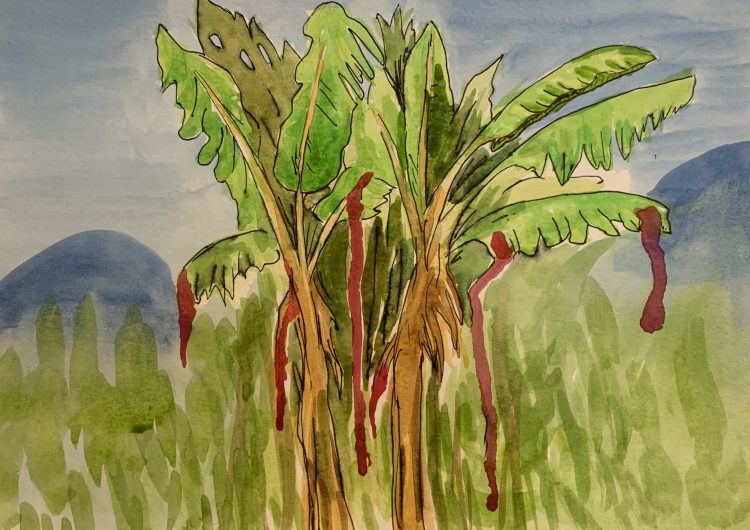People marveled at the three-story house in the outskirts of Licey al Medio. The speed at which a group of men built the cinder block structure was unlike anything they’d ever seen. The home towered over the others on this narrow street, a welcome distraction from the darkness that was engulfing nearby towns over the month of July.
The owner of the house was a woman in her 30s who had a son. She had their new home painted cerulean, a color that challenged the sky’s blue on clear days.
All that neighbors knew about the owner, Maribel, were the bits and pieces she offered. She said she was a single mother who had run into some money. A far-away tía who recently died had left her an inheritance. That’s what brought her and her 10-year-old son, Nelson, to this corner of town, she said. A fresh start.
Maribel was tall and slender and could have easily passed for a model. To neighbors, she appeared as someone who had once been poor, like them, and who now had too much money to know what to do with. She stuffed her home with furniture and lined her windows with lavish curtains. She wore silver bangles on both wrists and dyed her long hair brown every two weeks to hide her dark roots. She kept Nelson in brand name clothes and a chauffeur drove them everywhere, so she wouldn’t have to.
About two weeks after they moved in, Maribel brought home five goats and about two dozen chickens. They were corralled into a mesh enclosure in the backyard, near a wild finca of matas de plátanos. Soon after, screeches from the small farm began piercing the night.
Neighbors heard goat cries and what sounded like someone running through the trees behind Maribel’s house. The harsh cries came at a time of night when nearly everyone on their street was asleep, their bodies settled deep in their beds. A few times, neighbors asked Maribel what was happening.
“Nothing,” she always said, waving off their concerns. “One of my chivos had a nightmare.”
Maribel would stretch her lips into a smile, get into a waiting car with her son and leave.
One morning in September, Don Pedro, the barrio’s patriarch, walked over to the back of Maribel’s home after she and Nelson had left for the day. He came back holding patches of bloodied brown fur in his right hand. In his left were a few strands of mauve and black twisty hair.
He sucked what was left of his teeth. “That wasn’t a nightmare,” he told a half dozen people.
The neighbors’ minds wandered. Could it have been a bacá? The shape-shifting animal from the devil himself that brought you prosperity, but at a cost. Someone brought up the cases growing in nearby Moca, where animals and three people were slaughtered recently. Police hadn’t found a suspect or suspects. Many people thought it could be multiple bacás holding the people they made pacts with accountable. They heard the bacás’ appetites never stopped growing. Sacrifices were needed to keep them satisfied, whether willing or not.
No one had the courage to ask Maribel if she had made a pact with the devil. They tried to sleep even as her animals were being slaughtered between midnight and 3 a.m. They were afraid.
The killings became more frequent. And then one night they stopped. The next morning, neighbors were startled by a different kind of scream — Maribel’s. It was a terrifying sound, the kind that silenced even roosters.
The neighbors found Maribel running through the rooms in her home. She was searching for Nelson. She emerged from the house, her face so wet with tears that hair stuck to her cheeks. Maribel carried a green sleeve from the shirt she said Nelson had worn to bed the night before.
It takes some time to grow comfortable with a new neighbor, so one dared say this within earshot of Maribel: just about everyone in the barrio suspected it was a bacá that had taken Nelson. They’re sure the demonic creature devoured the boy.
Neighbors crowded around Maribel as she screamed in agony. The window to Nelson’s room had been ripped apart overnight. What used to be blinds were now chunks of wood scattered everywhere.
— “Mi hijo! Dios!” Maribel cried over and over.
The grieving woman knelt in the dirt and ran her fingers over her son’s blood. It now stained the cerulean exterior of the house.
 Amaris Castillo is a journalist, writer, and the creator of Bodega Stories, a series featuring real stories from the corner store. Her work has appeared in Latina Magazine, Parents Latina Magazine, Remezcla, La Galería Magazine, The Lowell Sun and Bradenton Herald. Born in Brooklyn, New York to Dominican parents, she credits the many tales she heard growing up to her love for storytelling. She has a bachelor’s degree from the University of South Florida and a master’s degree from Columbia University Graduate School of Journalism. You can follow her on Twitter @AmarisCastillo.
Amaris Castillo is a journalist, writer, and the creator of Bodega Stories, a series featuring real stories from the corner store. Her work has appeared in Latina Magazine, Parents Latina Magazine, Remezcla, La Galería Magazine, The Lowell Sun and Bradenton Herald. Born in Brooklyn, New York to Dominican parents, she credits the many tales she heard growing up to her love for storytelling. She has a bachelor’s degree from the University of South Florida and a master’s degree from Columbia University Graduate School of Journalism. You can follow her on Twitter @AmarisCastillo.






